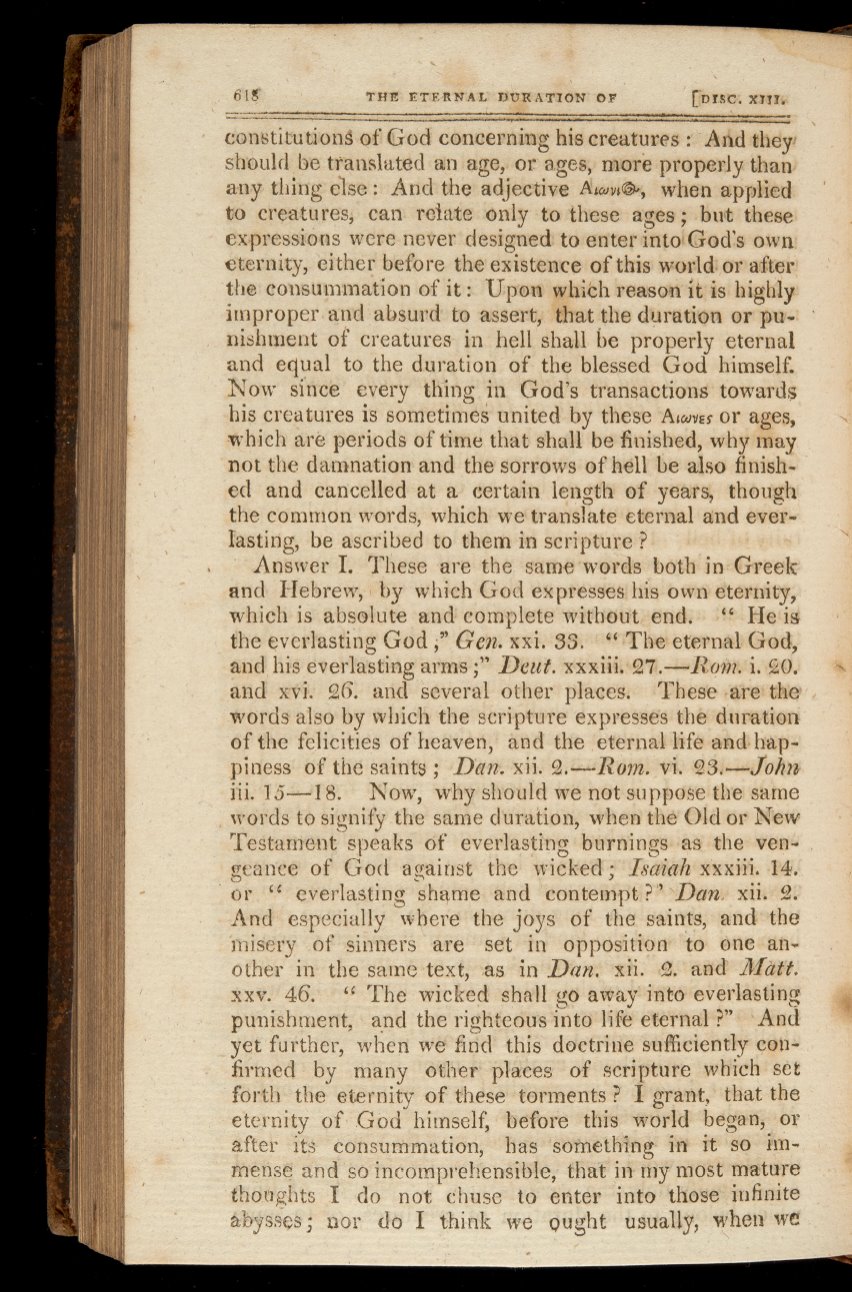

61Ë
THE ETERNAL DURATION
OF
[DISC.
XTTI.
constitutions of God concerning
his
creatures
:
And
they,
should
be
translated
an
age,
or
ages,
more
properly
than
any
thing
else
:
And the adjective
AtwvtO,,
when
applied
to creatures,
can
relate
only to these ages
;
but
these
expressions
were never designed to
enter
into,
God's
own
eternity, either
before the existence
of
this
world or
after
the consummation
of
it
:
Upon
which
reason
it
is
highly
improper
and absurd
to
assert,
that
the
duration or pu-
nishment of creatures
in hell
shall
be
properly
eternal
and equal
to the
duration of
the
blessed
God
himself.
Now
since
every
thing
in
God's transactions
towards
his
creatures
is
sometimes
united
by
these
Aiwvas
or
ages,
which
are periods
of
time
that
shall
be
finished,
why may
not
the damnation and
the sorrows
of
hell
be
also
finish-
ed
and
cancelled
at a certain length
of
years, though
the
common
words, which we
translate eternal and ever-
lasting,
be
ascribed
to
them
in
scripture
?
Answer I. These
are
the
same words both
in
Greek
and Hebrew,
by
which
God
expresses
his own
eternity,
which
is
absolute
and
complete without
end.
"
He
is
the everlasting God
;"
Gen.
xxi. 33.
"
The eternal
God,
and
his
everlasting
arms
;"
Deut.
xxxiii. 27.
Rom.
i.
é0.
and
xvi.
26.
and
several
other
places.
These are
the
words
also by which
the
scripture
expresses the
duration
of
the
felicities
of
heaven, and the
eternal
life
and
hap-
piness
of
the saints
;
Dan.
xii.
2.-
--Rom. vi.
23.
John
iii.
15
-18.
Now,
why
should
we
not
suppose
the
same
words
to signify
the same
duration,
when the Old or
New
Testament
speaks
of
everlasting burnings
as
the ven-
geance
of God
against the
wicked
;
Isaiah
xxxiii.
14.
or
"
everlasting
shame
and contempt
?"
Dan.
xii.
2.
And
especially where
the joys
of
the
saints,
and
the
"misery
of
sinners are set
in
opposition
to one an-
other
in
the same text,
as
in
Dan.
xii.
2.
and
Matt.
xxv. 46.
"
The
wicked shall
go
away into everlasting
punishment,
and the
righteous into
life
eternal
?"
And
yet further,
when
we
find
this
doctrine
sufficiently con-
firmed
by
many
other
places
of
scripture
which
set
forth the eternity
of
these
torments
?
I
grant,
that
the
eternity
of God
himself,
before this world
began,
or
after
its
consummation, has something
in
it
so
im-
mense
and
so
incomprehensible,
that
in
my
most
mature
thoughts
I
do
not
chuse to
enter into
those infinite
abysses;
nor
do
I
think
we
ought
usually, when
we

















